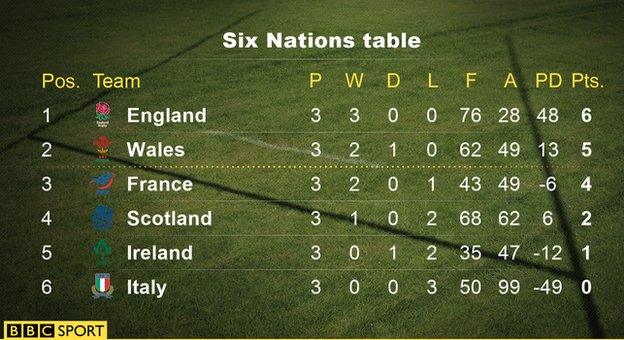Six Nations: Scotland's X-factor too hot for Italy - Mike Blair
- Published
BBC Scotland's Six Nations Extra
Scotland were in control for long periods of their success in Rome.
There were some uncomfortable phases and some lapses in concentration that might have been punished by superior opposition, but on the whole this was a very satisfying 36-20 win.
I have talked in previous articles about improvement being a journey and this was another step in the right direction.
Scotland are showing that they can consistently score multiple tries and beat teams ranked below them - think USA, Japan, Samoa at the World Cup and now Italy - where previously this hasn't always been the case.
I put this mainly down to the Scotland backline having the 'X-factor'.
Moments of magic
Think about the Scotland tries as examples where individual brilliance was key.
John Barclay try. [Tim Visser]
A 'two attackers v two defenders' situation was created in the outside channel - which in international rugby is sometimes as good as it gets for the attack - and now there is personnel to make the most of it. The focus will largely be on the error of Eduardo Gori coming out of the defensive line, but that does Visser a massive disservice. The way he drifted off the pass, briefly accelerated to interest the outside man and deliver a lovely soft pass to Stuart Hogg was sublime. Hogg made the most of the space and the excellent John Barclay followed up to score.
John Hardie try. [Finn Russell]
Again, this didn't come from a clear opportunity. Italy had a good defensive line, but Russell was able to manipulate a line-break by challenging the heavy Italian forwards, putting them on the back foot, allowing Hardie to jog over the line in the corner.
Tommy Seymour try. [Stuart Hogg]
Two versus two again. Where previously this could fizzle out, Hogg's stop and go drew in the outside defence for Seymour to go over. Very similar to Visser's work in the build up to the first try but with the added beauty of the one-handed offload out the back door.
These examples, together with individual moments from the Wales game two weeks ago, show the talent that is in this group.
Six Nations 2016: Italy 20-36 Scotland highlights
Dominant scrum provides base for Scotland
The most pleasing aspect from the game was the scrum though. It was so dominant and provided the base from which field position could be established.
Progression in this area has been significant and in itself goes a long way towards winning games.
However, things were by no means perfect. Two yellow cards, a squint throw in, a missed penalty to touch and some lapses in concentration straight after scoring points were evident and errors that have consistently dogged previous performances and losses.
For the next step in the journey to come to fruition, these are the areas that need to be addressed.
I believe this will come and the team will be confident of taking on the French at Murrayfield next.
From an Italian point of view, I wonder if skipper Sergio Parisse is regretting turning down the three points on offer with 12 minutes to go.
It would put them within striking distance at 23-29 with two minutes on the Russell sin-bin still left to play out. I would have been tempted to take the penalty.

Should captains be allowed to challenge decisions mid-game?
TMO referrals for captains?
After watching the game, I'm even more convinced that something should be put in place about captains having a certain number of Television Match Official referrals per game that they can request.
Two instances that stick in my mind were on 19 minutes and 60 minutes.
In the first instance, Italy were deemed to have taken the ball back into their 22m and then kicked the ball out on the full giving a lineout to the Scots deep in the hosts' territory. The replay clearly shows that the Italian winger had his feet in the 22m before playing the ball [the ball was actually outside of the 22m, but as it was moving this is inconsequential].
The assistant referee should have awarded the lineout on the Scottish 10m line. This results in a huge shift in momentum as the result of an avoidable error from the officials.
In the second incident, just prior to the Russell sin-binning and second Italian try, Scotland captain Greig Laidlaw was clearly lifted and dumped from a breakdown.
The scrum-half spoke to referee Jaco Peyper about it but was dismissed and play continued. This period was crucial and could have easily affected the outcome. If there was an official channel that Laidlaw could have gone down then it could have been avoided.

- Published28 February 2016

- Published27 February 2016

- Published27 February 2016

- Published14 September 2016
